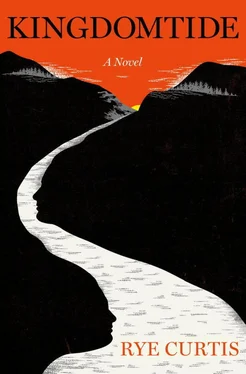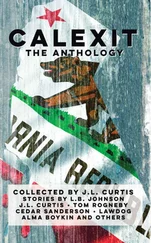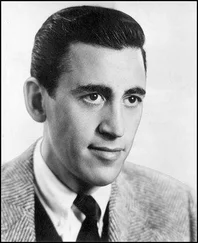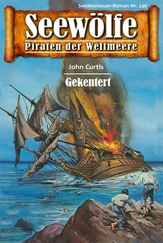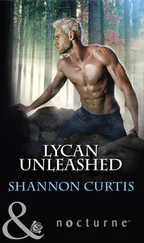I was mighty tired as the sun went down on what by my count was my seventy-seventh night out there in the Bitterroot. I looked through the trees to the world-old mountains behind me. I picked out the one I knew to be where the little airplane had gone down, where I imagined that Mr. Waldrip’s body yet dangled. The entire place looked smaller to me now. Through a break in the clouds the red sunset rolled down the mountain and turned it blue with night.
Over the bowed and sickly juniper I draped a filthy piece of the blanket I had preserved from the hut and made a tent to keep the spitting rain off. I did not build a fire that night. I wrapped myself in Terry’s coat and pulled my legs into a ball as much as I could and I slept.
I woke to the sound of the ocean and the sun on my face. Somewhere waves were breaking on a beach. I had not heard that sound in thirty-two years. The last time was just after my fortieth birthday. We had paid a visit to Mr. Waldrip’s brother in Florida to watch him pass away in a hospital near the water. After he did, Mr. Waldrip and I walked down to the beach and we sat out in the sun with our eyes shut. I recall listening to the waves and opening up my eyes to find Mr. Waldrip’s alligator-skin boots nearby with his socks balled up in them. He had gone and trotted off to wade out in the water with his blue jeans rolled up to his knees. He played there in the waves like a little boy and I recall thinking just how terribly much I loved him and how I sure did not look forward to the day when we would have to part ways.
I opened up my eyes to the sun. The blanket had blown off in the night and I could not find it anywhere. The rain had quit and so had the wind. I looked to where I had heard the waves and I heard the sound again. It was a peaceful swooshing behind the trees. The notion struck me that perhaps I had lost track of time and had traveled for months and had followed that river clear to the ocean.
I set my walking stick and pushed myself to my feet. The swooshing had gone again as quickly as it had come, but my eye caught something different through the trees. I pushed forward in my tore-up shoes, ducked under a spruce, and stepped out into the bright sunlight. My hair was longer than I had worn it since I was a young woman, my getup as strange as a city person’s and considerably tattered and now the color of earth. But bless you, I was standing on the side of a two-lane paved road!
I dropped my walking stick and went to my knees. I pressed the palm of my hand to the warm asphalt. All was dead quiet. There were no cars on the road that I could tell in either direction. It went on straight in both ways, cleaving a timbered valley until it could not be seen. I stood up again but had no use for my walking stick. I looked from one end of the road to the other.
It was not but ten minutes before a blurry element appeared in the far haze off to my left. I could not take my eyes from it. They stung and tears ran off my cheeks. The object drew closer and closer and by and by I could see it was a station wagon. Even now I can shut my eyes and conjure it, growing larger on the road until it slowed and halted just a couple yards from me.
A young woman got out. She had on a green bowler hat and a black leather coat such as I have seen worn by noisy motorcyclists. She looked at me like I was a polka-dotted cow. She said: Are you all right, ma’am?
I could do with a ride to the nearest town, I told her.
This dear young lady, whom I would later know by the name of Sidney Wygant, was a mighty kind and earnest young woman. She had been away at school in Spokane, Washington, for some curious thing called urbanology and was driving home to Colorado. She had decided to take the scenic route through the mountains.
Sidney approached me and gave me her arm.
She walked me to her station wagon and opened the door and helped me inside, then got in on the other side and set us off down that paved road away from the wilderness. I looked ahead out the windshield and waited for the buildings and power lines to rise on the thin horizon beyond the little pine-tree-shaped air freshener swinging from Sidney’s rearview mirror.
When I later made my return to Clarendon, Sheriff Daugharty had to let me into our dear little house under the water tower. By that time the locks had been replaced, being that the sheriff had been obliged to knock down our front door. Not a soul had been privy to the key Mr. Waldrip kept hid under the rock shaped like a steer. The house was dark and empty. About the only thing left in it were the furniture marks in the carpeting, and someone had missed the First Methodist calendar of 1986 pasted on the pantry door. The pantry light switch was left up and the bulb had gone out, and the calendar pages stirred in the breeze blowing in from the front, where the sheriff stood waiting for me. The pages were still flipped to August. I was overcome with sentiment then and I ran my finger over that little circle Mr. Waldrip had drawn around the 31st, the first Sunday of Kingdomtide. I myself have since circled on that calendar the last Sunday of that desperate season, the 16th of November 1986, the day I escaped the fearsome Bitterroot.
However nothing escapes the hands of the clock. And nothing of life comes to mean exactly what you expect it will, and neither is it often simple nor easy, particularly when you get to be my age. Though I do not care for the language, I am here reminded of something that Colonel Goodnight, the father of the Texas Panhandle and inventor of the chuck wagon, once said: Old age hath its honors, but it is damned inconvenient.
It is winter now of the year 2006 as I close this account and I mean to tell you I am not the same woman I was. Whatever strange parts here remain of me will soon be returned to Clarendon. I am having my body flown back. While I do not care to live another day in Texas, I will not mind being buried there. My body will be interred at the Clarendon Citizens’ Cemetery, there under the drifting seeds of a little ole cottonwood beside my dear Mr. Waldrip.
The author would like to thank: James Hannaham, Doug Stewart, Ben George, Helen Garnons-Williams, Reagan Arthur, Craig Young, Ben Allen, Liz Garriga, Szilvia Molnar, Danielle Bukowski, Caspian Dennis, Ashley Marudas, Gregg Kulick, Oliver Gallmeister, Liv Marsden, Philippe Beyvin, Evan Hansen-Bundy, Alice Lawson, Joe Veltre, Amanda Lowe, Clarinda Mac Low, Don T. Curtis, Diane F. Curtis, Shanna Peeples, Deidre F. Schoolcraft, Rhonda LeGate, Madison David, Blair Pfander, Bob LeGate, Jessy Lanza, Winston Case, Ayse Hassan, Ahbra Perry, Taylor Higgins, Emma L. Beren, Penny Nicholes, Madeline and Lester Farrington, the author’s family and friends, the Diamond Tail Ranch, and Emily “Mimi” LeGate.
Discover Your Next Great Read
Explore book giveaways, sneak peeks, deals, and more.
Tap here to learn more.
Get sneak peeks, book recommendations, and news about your favorite authors.
Tap here to learn more.

Rye Curtis is originally from Amarillo, Texas. He is a graduate of Columbia University and now lives in Queens. This is his first novel.
The characters and events in this book are fictitious. Any similarity to real persons, living or dead, is coincidental and not intended by the author.
Copyright © 2020 by Rye Curtis
Cover design by Gregg Kulick
Cover copyright ©2020 by Hachette Book Group, Inc.
Hachette Book Group supports the right to free expression and the value of copyright. The purpose of copyright is to encourage writers and artists to produce the creative works that enrich our culture.
Читать дальше
Конец ознакомительного отрывка
Купить книгу
